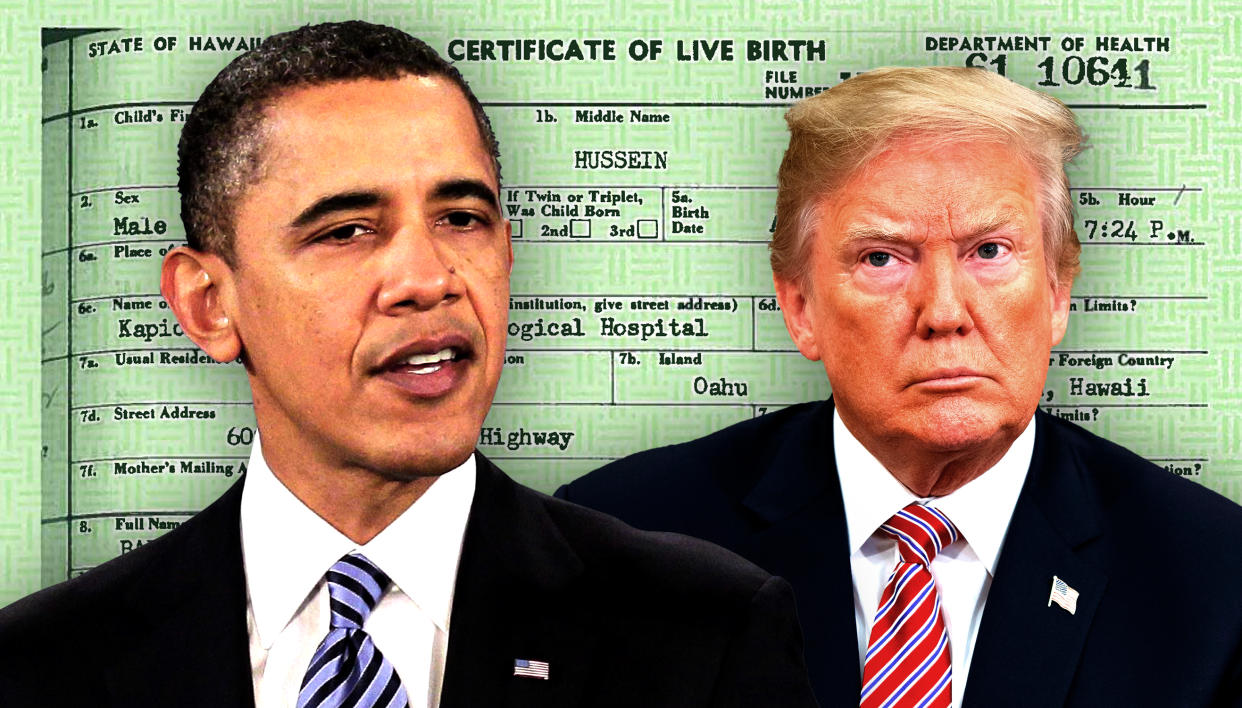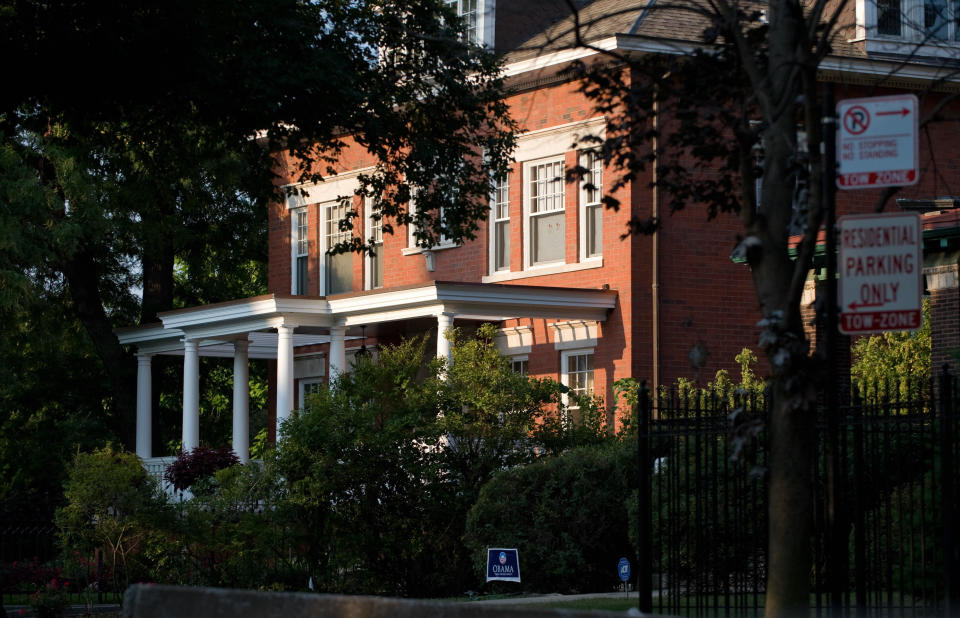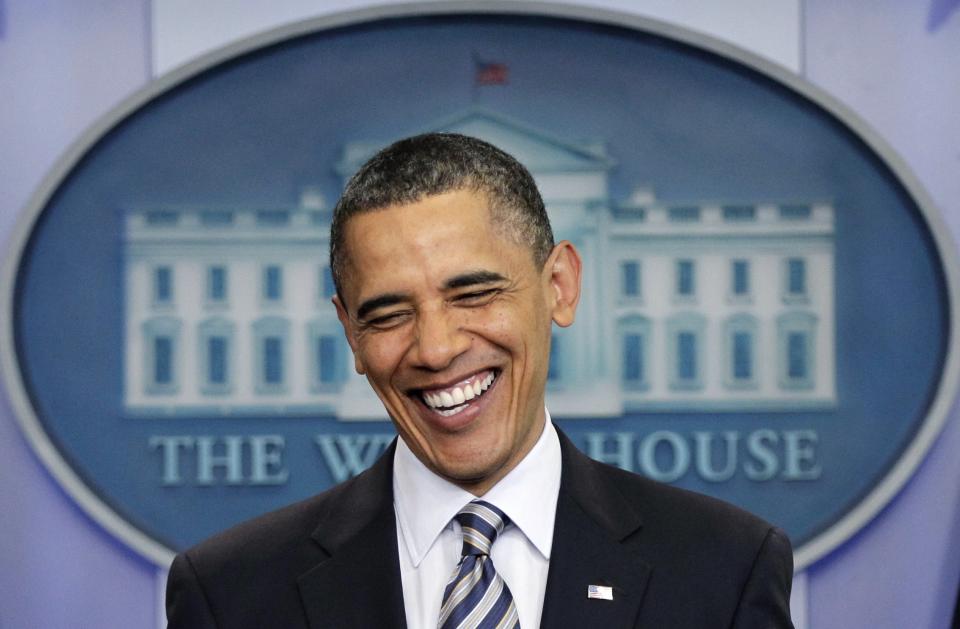New book details the inside story of Obama's birth certificate and the birth of fake news

Dan Pfeiffer, former assistant and senior adviser to President Barack Obama, thinks he knows the exact date the modern era of fake news was born: April 27, 2011.
“I had walked into the briefing room that morning with 50 copies of Barack Obama’s birth certificate,” Pfeiffer recalls in a memoir, “Yes We (Still) Can: Politics in the Age of Obama, Twitter, and Trump,” set to be published next week. “So we could prove once and for all the man who was in his third year as president after winning an historic electoral landslide was an American citizen and eligible to be president.”
The term “fake news” was not yet part of the political lexicon, Pfeiffer writes, “but this might very well have been the moment it when it rose from something that elicited an eyeroll to something that necessitated a full-throated response from the White House.”
The claim that Obama wasn’t born in the United States — the so-called birther conspiracy — first cropped up during the 2008 presidential campaign, when the then Illinois senator was campaigning in Iowa. The story originated in conspiratorial emails that were forwarded by fringe groups in an effort to undercut Obama’s candidacy.
While the mainstream media mostly refused to amplify it, “birtherism was gaining a disturbing amount of traction among some of the voters in rural Iowa,” Pfeiffer writes. “Our field organizers were getting questions from the voters they were contacting.”
Most of the questions were “well-intentioned,” according to Pfeiffer.
“Democratic primary voters were scarred by two consecutive losses and were reviewing the information through the prism of Obama’s electability,” he writes. “If we nominate Obama and this information comes out, will the Republicans win again?”
“Our field staff would tell people it’s not true,” Pfeiffer continues, “but they wanted proof both to soothe their own concerns and share with their friends and family.”
The Obama campaign decided to release Obama’s certificate of live birth — a document commonly issued by hospitals that includes basic information about a child’s birth for record keeping. The information is then sent to the Office of Vital Statistics or the State Register to create an official, or long-form, birth certificate.
“This was not an easy decision,” Pfeiffer writes. “It ran counter to one of the cardinal political rules of political communications: Don’t give oxygen to malicious rumors. It’s better to ignore them than dignify them with a response that would catapult rumors from the dark corners of the internet to the front pages of the New York Times. But that rule, like most of the rules that govern public relations strategy, was written before the internet.”
The tactic worked, at least in Iowa, but the birther issue followed Obama to the White House.
“As far as I was concerned, the issue had been put to bed,” Pfeiffer writes. “We were inundated with the more serious issues that come with running the world and I didn’t think about those old campaign rumors.”
But fringe members of the Republican Party wouldn’t let it go.
“They had become convinced that the certificate of live birth that we released during the campaign was a forgery,” Pfeiffer writes. “And then Donald Trump, a man whose depraved desire for attention would make a Kardashian blush, latched onto the cause.”
When he did, in early 2011, Trump was trying to generate publicity for his NBC reality show, “The Celebrity Apprentice.” Trump even floated the idea of running for president.
“Almost no one took the idea that Trump was going to run seriously,” Pfeiffer writes. But Trump realized he could get even more attention if he brought up the birther conspiracy.
Trump was also “unburdened by the shame that keeps most people from outright lying,” Pfeiffer argues.
“All of a sudden, all the media could talk about was Donald Trump and the president’s birth certificate,” he writes. “It was coming up in Obama’s press interviews. It was becoming clear we had a problem.”

According to Pfeiffer, Obama first raised the idea to release his birth certificate to him while walking to the Oval Office.
“Maybe we should put the birth certificate out and be done with this,” Obama said.
“But you know we can’t do that, right?’” Pfeiffer responded.
Obama said he agreed, but “I could tell he didn’t really mean it,” Pfeiffer writes.
A few weeks later on a fundraising trip to Chicago, Obama spent the night at his home.
“Whenever he was home, often alone, he would root through all his stuff; on this particular trip, he was going through a box and found what he believed was his birth certificate,” Pfeiffer writes. “To this day, it isn’t clear whether he stumbled upon this document or went looking for it. I have always suspected the latter.”
“Excited about his find,” Obama brought it back to the White House and showed it to White House counsel Bob Bauer.
“Bauer took one look at what Obama had in his hand and knew it wasn’t his actual birth certificate,” Pfeiffer recalls. “Instead the president had found a ceremonial document sold in hospital gift shops. This is the document that families often frame, but you can’t use it to get a passport or debunk a racist conspiracy theory burning up the internet.”

Obama, though, was undeterred, and directed Bauer and David Plouffe, another senior adviser, to acquire his official, or long form, birth certificate from the state of Hawaii.
“He didn’t commit to releasing it but told Bauer and Plouffe to get it so we had it in our back pocket just in case,” Pfeiffer writes.
In late April, Obama informed top aides that he wanted to go into the White House briefing room and release the birth certificate himself. Pfeiffer thought he was “f***ing crazy.”
“The president wanted to use this opportunity to take the conversation to a bigger idea beyond the birth certificate,” Pfeiffer recalls. “He wanted to talk about the danger of the political conversation getting diverted into side issues. This was a better idea than simply going in front of the nation and saying, ‘Hey look! I’m American! Deal with it!’ But I was still horrified by the thought of the president being forced to go in front of the nation to defend his legitimacy. It felt beneath him. It felt beneath the office.”
He put it another way: “The president of the United States was being forced to respond to a reality TV star less relevant than the ‘Real Housewives.’”
Pfeiffer reluctantly agreed to the president’s plan on condition that he, Pfeiffer, would release the form and brief the media first.
“It would at least keep Obama from having to answer a bunch of logistical questions about how we got the birth certificate,” he writes.
They also decided to keep the release plan a surprise.
“If we announced it in advance the press would lose its collective shit,” Pfeiffer writes. “There would be a CNN countdown clock ticking down to the second of release.”
So when Pfeiffer entered the room to hand out Obama’s birth certificate, it was half empty.
“It had seemed reporters thought it would be a newsless briefing,” he recalls. “Then one of the press assistants started handing out copies of the birth certificate. All hell broke loose.”

By the time Obama addressed reporters, later that afternoon, the birth certificate issue was receiving wall-to-wall coverage.
“Now, normally I would not comment on something like this, because obviously there’s a lot of stuff swirling in the press on at any given day and I’ve got other things to do,” Obama said. “But two weeks ago, when the Republican House had put forward a budget that will have huge consequences potentially to the country, and when I gave a speech about my budget and how I felt that we needed to invest in education and infrastructure and making sure that we had a strong safety net for our seniors even as we were closing the deficit — during that entire week the dominant news story wasn’t about these huge, monumental choices that we’re going to have to make as a nation. It was about my birth certificate.”
Obama added: “We’re not going to be able to do it if we are distracted. We’re not going to be able to do it if we spend time vilifying each other. We’re not going to be able to do it if we just make stuff up and pretend that facts are not facts. We’re not going to be able to solve our problems if we get distracted by sideshows and carnival barkers.”
Two days later, at the White House Correspondents’ Dinner, Obama hilariously skewered Trump and the birther conspiracy, with Trump in scowling attendance.
“Trump had been ushered off the national stage in humiliation, his foray into politics forever ended,” Pfeiffer writes. “Or so we thought.”
_____
Read more from Yahoo News:



